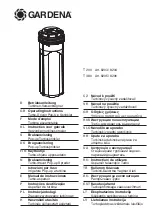
4 Reference guide
The following sections describe the different concepts and menu screens of Alpine Navigation
System.
4.1 Concepts
The following sections describe and explain navigation-related concepts.
4.1.1 2D/3D GPS reception
The GPS receiver uses satellite signals to calculate its (your) position and needs at least four
signals to give a three-dimensional position, including elevation. Because the satellites are
moving and because objects can block the signals, your GPS device might not receive four
signals. If three satellites are available, the receiver can calculate the horizontal GPS position
but the accuracy is lower and the GPS device does not give you elevation data; only 2D
reception is possible.
Several factors have an impact on the deviation between your real position and the one given
by the GPS device. For example, signal delay in the ionosphere or reflecting objects near the
GPS device have a different and varying impact on how accurately the GPS device can
calculate your position.
4.1.2 Natural and TTS voices
Natural voices are the traditional type of voice instructions. Every phrase that occurs in voice
guidance messages is recorded in a studio with a real person. The advantage of pre-recorded
voice is that it sounds really natural, but the range of instructions that can be given this way is
limited. Location-specific information such as street names cannot be announced.
TTS technology provides a machine-generated way to give voice instructions. The advantage
of TTS is that it can announce street names, traffic events, route summary, and traffic rules.
4.1.3 Road safety cameras and other proximity Alert Points
There is a special proximity warning for road safety cameras (like speed or red light cameras)
and other proximity Alert Points (like schools or railroad crossings). These Alert Points are not
part of Alpine Navigation System. You can download Alert points from alpine.naviextras.com
or you can upload points in a specific text file if needed.
There is a proximity warning for special locations such as schools or railroad crossings. You
can add your own Alert Points. See page 49.
The application can warn you when you approach road safety cameras like speed cameras or
dangerous areas like school zones or railroad crossings. You can set up the different alert
types individually in the Warnings settings, see page 70.
The following warning types are available:
Audio warning: beeps are played (if the voice guidance language that you selected is a
natural voice) or the type of the alert can be announced (TTS voice) while you are
















































